Word walls can feel like one more thing to maintain in the classroom, but when I see a student reference the word wall for help, then the word wall is well worth the extra effort.
Here are a few tips I have for creating, maintaining, and maximizing the use of a middle school math word wall.
Keep reading to check out Maneuvering the Middle’s new Middle School Math Word Wall.

1. Structuring Your Word Wall
A word wall that includes the math term, the definition, and a visual representation will make the most impact. The text should be visible from across the room, and should be in a place where a majority of students can see it. I have many English Language Learners in my classes, so word walls are especially helpful for them. Some of my fellow teachers even use the Spanish translation as additional leverage for students. (Keep reading to learn about a new resource from Maneuvering the Middle!)
I like my words to stay up all year as we learn and review the words. This helps students use academic vocabulary and make connections between the different units. I love when a student can see how a proportional relationship and a linear equation are connected!
At the beginning of the year, I only have the categories posted at the top of the wall. I then include the words as they are introduced, then move on to the next category of words included in the next unit.
2. WAYS TO USE
Incentivize Academic Vocabulary
While word walls make a classroom beautiful, their ultimate function is to be used. This means that you need to make students aware of its existence and its usefulness.
To do this, incentive using vocabulary terms from the word wall by rewarding students who use the vocabulary correctly when answering a question or explaining an answer. When students are about to begin practicing a new skill, I ask students to point to the word that will help them if I am unavailable.
During mad minute exercises, I include vocabulary that they can provide a definition with one word (example: quotient=division). If they don’t know it, they can take an extra second to look up at the word wall.
Flyswatter Game
If you want students to get familiar with your word wall, use the Fly Swatter Game. This is a very engaging review game. If you are like me and don’t bother to cover up anything in your room before a test, this will help remind students where to look when they are stuck. Two students face off with fly swatters in hand. You give them a prompt such as “2, 4, 6, 8” are examples of ______” And the first student to swat the word ‘multiples’ earns their team a point.
Non-Content Words
Word walls do not have to be specific to your content area. I have character terms like tenacity, curiosity, courage, and community on my wall too. These are our school values, and it is important that these words are referenced by students and me daily.
Flashlight Game
This game is great for those last few minutes of class as a sponge activity. Turn off the lights and use a flashlight to point to a word on the wall. Students can then shout out an example, the definition, or even a counterexample.
3. Making a Word Wall
Knowing that teachers have more to do than hours in the day, creating the word posters is a task easily assigned to students who finish early or those students in your homeroom who are always asking how they can help.
After a unit test, I would have early finishers complete this as an activity for the next unit. I would give the word + definition + example + picture that I wanted them to use, and choose the best ones to go on the wall. I did this for several years before I wanted a more uniform look.
There are also lots of resources on Pinterest or TPT to choose from. My advice is to batch this task during the summer. Print everything you need, laminate, and decide how you will store them. Then you can post the new words for each unit to your growing word wall.
Update 7/28/2023: Maneuvering the Middle now has a Middle School Math + Algebra 1 Word Wall.
As you can see in the video below, our Word Wall includes 190 essential math terms, their clear-cut definitions, and their visual representations.
We’ve included Spanish translations for all terms and definitions, ensuring a supportive and accessible learning experience for English Language Learners.
They were designed to be minimal prep and flexible to customize the formatting to suit your students’ unique needs.
At first a word wall might seem excessive or more like an “extra” thing to do, but now that I have seen how my students use it, I am sold! How do you use your word wall in your middle school classroom?
Maneuvering the Middle has been publishing blog posts for 8 years. This post was originally published in November of 2016. It has been updated for relevance and clarity.
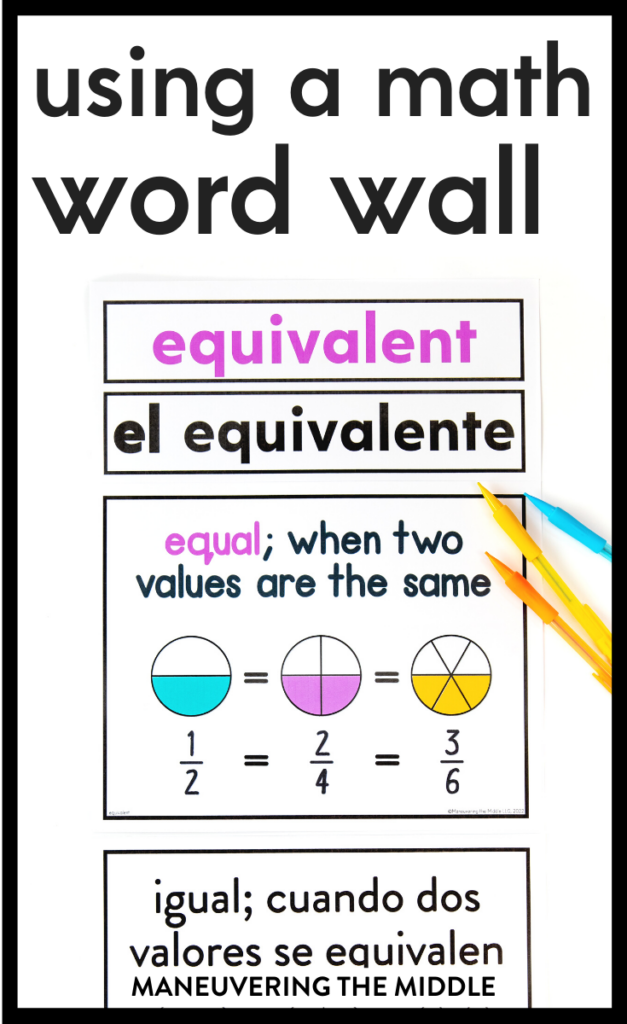
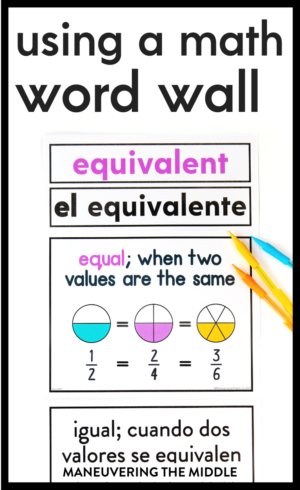
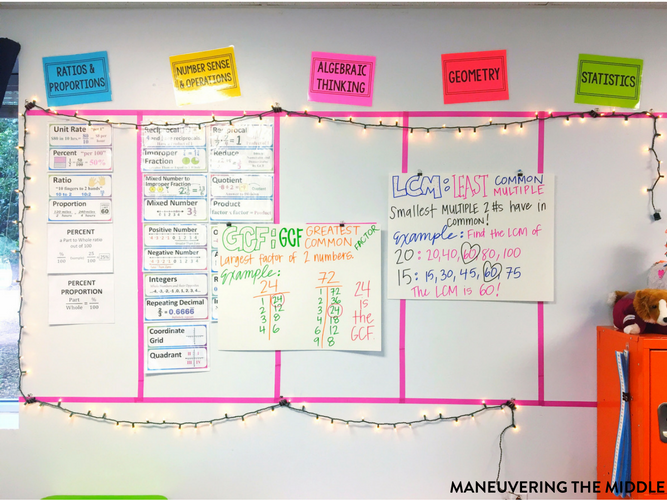
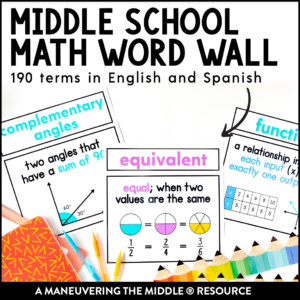
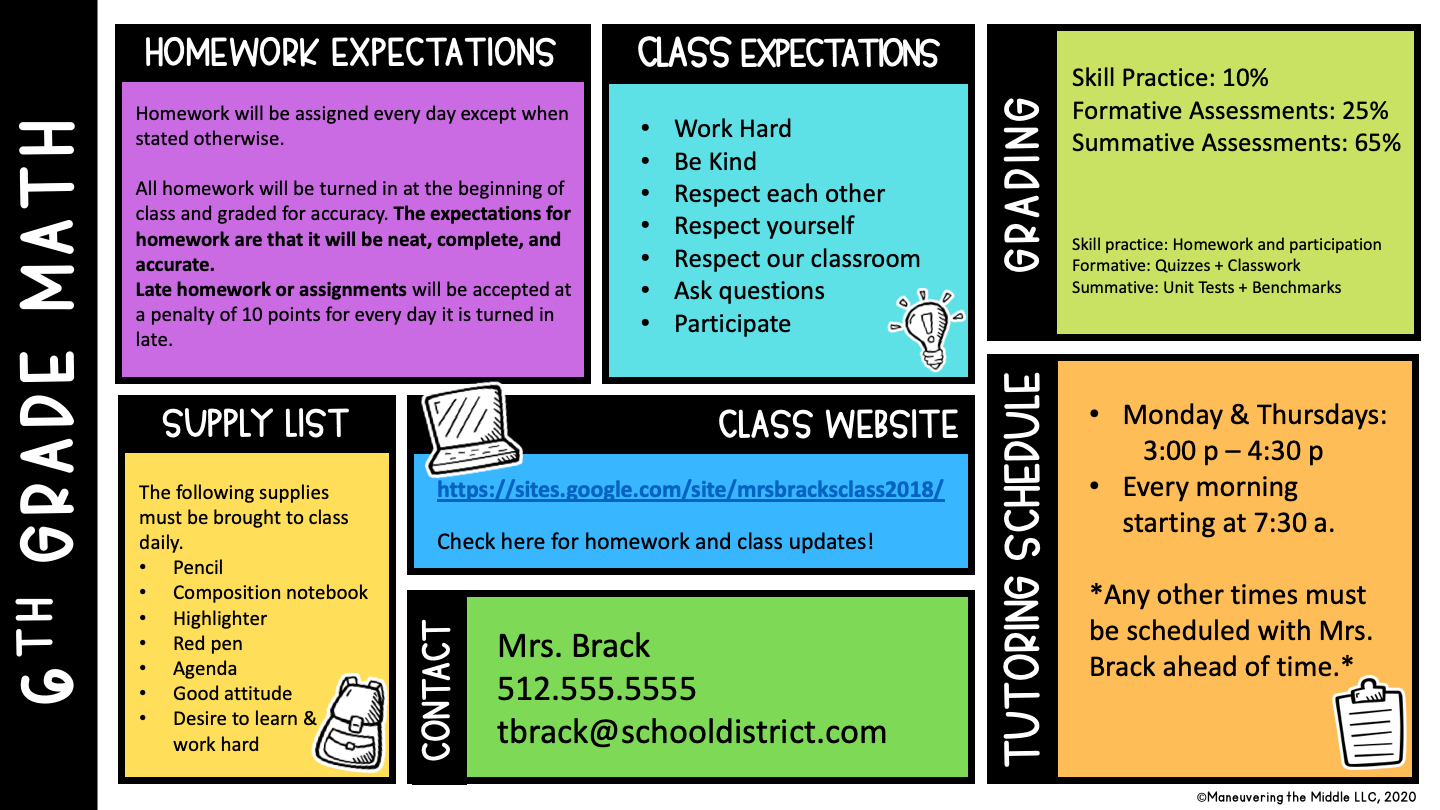
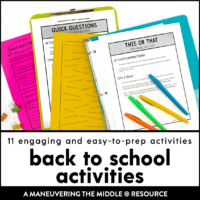
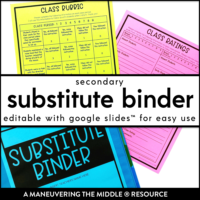
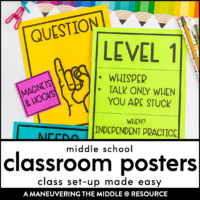
What do you do with your word wall on test day? Do you cover the wall with paper or something to make sure students know the vocabulary on assessments?
Honestly, I only cover during state testing. I think you could what is best for your class!
Hi! Do you put the whole section up at once or do you put the words up as you come to them in your lesson?? Love your website- helps me so much!
I am so glad you have found the blog helpful! I would suggest either at the beginning of the unit or as they are introduced.
Hi,
Can I purchase the math word wall for middle school? Is that something that is available?
Thank you,
Vicky
Hi Vicky! I don’t actually own this word wall, but I did get it on TpT. Check the link in the post. Thanks!
Is there a TPT word wall that you would suggest for 7th and 8th that is aligned with Texas curriculum?
Hi, Regina! I would recommend ours! You can grab a link in the blog post.